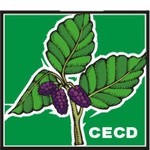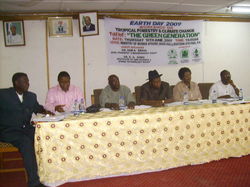The Centre for Ecological and Community Development (CECD) RC: 89699
Who we are?
The Centre for Ecological and Community Development (CECD), is a Civil Society Organization,registererd in Nigeria for the protection and conservation of environment with special emphasis on tropical rainforests, shoreline, marine resource managent and climate change
OUR VISION
CECD envision to see a society where critical ecosystems are protected, conserved and restored for present and future benefits of human and wildlife that depends on them
OUR MISSION
The mission of CECD is to protect ecosystems by promotimg sustainsustable land use planning, buiding climate resilience by conserving, protecting and restoring tropical rainforests, biodiversity, and Coastal sholine and marine resource managements
Our Goals
1. To Protect restore and conserves over 25,000 Sqkm of lower Guinea Coastal Wetlands and rainforests to sequester Carbon and reduce biodiversity loss and return over 10 millions tons of carbon by 2030.
2. Support over 20,000 indegenous rural faming households in Nigeria to build resilience to climate change, with sustainable livelihoods and Land use planning,
3. Building over 10,000 indegenous smallholders capacity for for managements and preservation of their forests and set aside high carbon stock and high conservation value natural ecosystems
This is to support the implimentation of Nigeria Adaptation Program, UNFCCC Nationally Appreciate mitigation Actions NAMA, as well as Sustainable Development Goals 13,14 ,15
Our Objectives
CECD objectives are:
- To Promote the conservation and sustainable management of forests and biodiversity
- Help communitiess to Adapt and mitigate the impact of Climate Change with land use planning, for meaningful reduction in carbon emissions caused by deforestation and forest degradation
- Support over 20,000 indegenous households on pro-poor Forest based livelihoods developments, such fish faming, snail farming especially among forest-dependent communities
- Promote ICT Development on Land use mapping, Monitoring and Varification on Carbon Finance and emission trading market
- Urbanization; Housing and climate change awarenss campaign
Srategies
- Environmental Advocacy and Publicity
- Grassroots mobiltzation, awareness on climate change Adaptation Action Plans
- Capacity Building through town hall meetings, workshops and simposium
- Renewable and Sustainable NTFP Marketing Development Strategies
- Participatory tropical rainforest Conservation projects, Research and Development
- collaborates with Development partners,Governments, and research institutions
- Foster the implementation of the Nigerian Government Tropical forest Action Plan (TFAP)
- Biodiversity Strategy and Action Plan (NBSAP) at the States and communities.lev
Members International Conservation Organizations
.Poverty and Conservation Learnig Group
title="Niger Delta Forest for Life NAMA Support Project" href="https://www.climate-chance.org/en/best-pratices/niger-delta-forest-for-life-nama-support-project/">Our Project
Innovates for Forests and Biodiversity Conservation
Why Innovates For Climate Change?
We need your help to upgrade our site!
Donate to support our projects
The impact of Climate Change is currently causing more damage in our communities,our people depends extensively on rainfall circle and With intermittent variation in rainfall and temperature changes is impactin our food production. Therefore we CECD helps for Adaptation planning and Investments in the local communities of Niger Delta.
We cannot do much without your Assistance
Kindly donate to support our work with
United Bank for Africa (UBA) Account:
Naira:1023733043
$ 3003965817
€ 3003965848
£ 3003965831
Swft Code: UNAFNGLA
QUICK LINKS
ht:tp//network.earthday.net/group/centreforenvironmentalandcommunitydevelopment
| UN Forum on Forests (www.un.org/esa/forests/) |
ISSUES ON CLIMATE CHANGE
ISSUES ON GLOBAL WARMING AND RISES IN THE SEA LEVEL
It is the consensus opinion from scientist that the atmospheric concentration of some gases such as carbon-dioxide, Co2 clorofloro carbon, methane, nitrous oxide, has been responsible for 50% of the green house effect that is changing the climatic zones worldwide.
Because of natural variations in climate, it is difficult to measure warming over large areas. Scientist agreed, however, that increases in atmospheric concentrations of greenhouse gases will cause higher temperatures worldwide. Even an increase of a few degrees might cause serious melting of the polar icecaps, a gradual rise in sea level, a disruption in normal weather patterns, possible increase in forest fires, and the extinction of species.
A U.S. Environmental Protection Agency report say the 10 warmest years was recorded in the past 15 years, with 2005 and 1988 as the warmest. The warmer temperature are expected to cause other problems, snow cover in the northern hemisphere has been decreasing. About 3,250 square kilometre ice shelf in Antarctica wasrepored to have collapsed in early 2002. Sea level could rise significantly in this century.
Since the third of the world population lives near the sea this could eventually result in loss of homes and farmlands. Scientist also predicted that higher temperatures will result in higher precipitation; with a greater frequency of weather events such as storms that are ravage the world today. Others also believe that climate changes will result in the spread of diseases such as malaria, dengue and cholera.
Though, issue of global warming and rises in the sea level has been subjected to scientific discussion and public debate for the past three decades. In deed it is well recognized that human factor has become very significant in the balance of forces that determine the earth’s climate events
According to Professor Olukayode Ojo,a professor geography, the atmospheric concentration of green house gases have grown significantly since 19th century, for instance he say Co2 have increase from about 280 to almost 360 ppmv3, CH4 from 700 to 1720 ppbv and N2o from about 275 to 310 ppbv ''
EFFECT OF CLIMATE CHANGE ON NIGER DELTA
No matter the level of the uncertainties in the knowledge of the characteristics and future trends of global warming; the sea level rise will have significant problems worldwide, and coastal innudation would compound the serious problems of sustainability of our environment and the management of our natural resources, the climate change and sea level rise will threaten the coastal Zones and low lying setlements of Niger Delta which are already constantly plagued by floods and erosion.
As noted by Prof. Ojo et al (2001) with sea level rise of one metre for example, inundation in the Niger Delta may render 15, 000km2 of land at risk, while soil erosion may claim more than 300 km2. According to Prof Ojo Alukayode the Dean faculty of social sciences, Lagos State University, ''with 1.0 metre sea level rises it risk about 2 to 3 million people that could be displaced in the Niger Delta.''
It has been estimated that along the coast line of the Niger Delta alone, 110 villages with value of 35 million US dollars, and about 550 villages with values of 175 million us dollars would be impacted with an eventual sea level rise of about 0.2m and 1.0m respectively. According to experts, part of Port Harcourt municipality, Bonny, Okirika, Degeme Sagbama, Ogbia, Yenagoa, Brass, Nembe Warri, Koko, Agadagba Gelegele, Ayetoro, Marihin and many other coastal towns of the Niger Delta may be inundated
Address:
Operation Office: 183 Bende Street, Port Harcourt Town, Rivers State, Nigeria
Registered Office: 581, Ikwere Road, Second Floor, Beside Pin Oil,Rumuigbo, Port Harcourt.Tel:+2348064365843
Ondo State Aiyesoro House, Near Baba Omo, by Atlantic Junction Igoba First Gate, Akure

